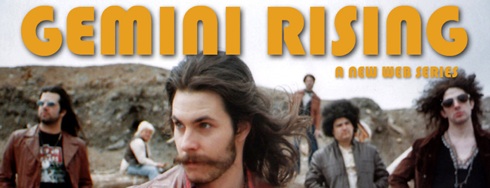
Burrowing through the hidden recesses of Tivo’s “Video on demand” menus, past the usual high-profile Amazon and Netflix offerings, I recently tripped over a set of sub-menus that surfaced lo-fi, low-profile offerings pulled straight off the web. It was there I stumbled on Gemini Rising, a web-only mini-series about a mythical ’74 band that looks like a bit like Skynyrd, sounds a bit like Tull (or is that Deep Purple?), and acts like everyone you knew in high school (assuming you went to high school in the 70s/early 80s). The elevator pitch:
In 1974, progressive rock band “Gemini Rising” returned to the studio to begin work on their second album and were never heard from again…until …
A somewhat more detailed back-story can be found on the band’s MySpace page, if you squint hard enough through the background images:
Welcome to the rise and fall, and rise again, of one of the most progressive of the 1970’s progressive rock bands: Gemini Rising. A rare American act, the McKenzie brothers of Levittown, Pennsylvania, created a unique blend of celtic/blues/space/carribean/utopian rock fusion that propelled songs such as “Electric Lady of the Lake” and “Golden Star Showers” to the top of the FM radio play lists. Tragically, the Mckenzie brothers recorded only two albums together, but due to the rediscovery of rare archival footage partially assembled here, you may experience the triumphs and tragedies of this unique band of talented troubadours.
Beyond that, little is known about Gemini Rising. The rest you’ll have to divine from the clips.
Gemini Rising is not a garden variety Spinal Tap or Mighty Wind knock-off tackling ’74 prog rock — it’s more subtle than that, and quite a bit more believable. In place of satirical concert footage, Gemini is more inclined to show the band hanging around a scuffy apartment smoking weed in anticipation of a pathetic-looking vegan Thanksgiving dinner, which is brilliantly interrupted by a band-mate bursting into the room clutching a copy of the latest Genesis record. To accompany the sonic unveiling of what they all agree is “the future of music,” lead singer Robert (Righteous Jolly) eats some bad acid and freaks out in the tub, questioning his worth as a real musician. Pathos ensues.
When Gemini Rising retreat into the wilderness (with guitars) to “find themselves” and end up noodling mindlessly to the accompaniment of birdsong, their manager claims that a nearby goose is making more music than they are. Robert, whose fatal flaw is a volatile temper, counters with a powerful philosophical rejoinder to which no rational reply is possible: “The goose is an artist. The goose is a @#%$^& artist!”

My 6-yr-old son shot this image of Righteous Jolly off the TV screen. Really.
The band’s epic photo shoot climaxes when a world class photographer none of them have heard of gets them to stand around in loin clothes in knee-deep mud, going for a set of publicity shots that will give them a more “authentic” look.
The series really gets down to business in episode 5, If Encounter Group, which plays on the shaman-as-sheister theme of EST and other self-help groups of the time that purported to be about self-improvement, but turned out to be about getting the spiritual guru good and laid. The “Pillar of Self cocoon,” aka gauzy-make-out-booth-in-the-woods sequence is just ridiculous enough to be believable. The episode also includes the excellent conflation of bongo-ist “Blind Cleve Jefferson” with “Blonde Cleve Jefferson.”
The footage is all hand-held, verite’ style. And, like all cheaply developed film from the 70s, the film stock is yellowed and scratched, with the random stray hair stuck to the projector lens. A cheap trick, but it works.
Mouth watering, right? The mini-series can be viewed in all its weed-fogged, amber-tinted, vegetarian glory here. The Gemini Rising blog is also worth checking. A single track from the mythic band is available on iTunes.
Very entertaining find. But how can emulating Spinal Tap be described as garden variety? They opened for a puppet show!
great find! the green side of things sound a bit forward-ro (opposite of retro) but i love that these tropes are becoming the chewing cud of pop culture.